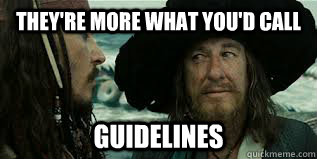I'd like to see the OP tell a Klingon that honour is a bunch of hooey..
Depends if I'm about to blow up his spaceship or not.
I'd like to see the OP tell a Klingon that honour is a bunch of hooey..
I always thought of Klingons to resemble feudal Japan. Even their armor and weapons were of east Asian design. Torres just likes to blame her Klingon side for her faults and anger issue.From the bits and pieces of TNG I've seen Worf began as an allegorical figure for US/Western militarism. As such, he wasn't dishonorable but he wasn't heroic. On Voyager, Torres and the dreadlock Klingons aka Kazons are symbolically Black people. This is why practically every Torres episode is gruesome. The seventh season episode where she tries to create a blonde blue-eyed child by genetic engineering is particularly problematic. Treating Black people as literally Alien, even symbolically, is incredibly wrongheaded. Ron D. Moore, in his quasi-psychotic rant about Voyager, told of being invited to do something with Torres but naturally, given his skill level, passed.
I think the only reason Worf was the way he was, is that because he grew up away from any Klingons.
I have sometimes wondered if Worf isn't the best representative of the Klingons, so much as he is representative of what they should be. As a Klingon who grew up "off world" he holds himself to a much higher ideal than those back on Qu'onos.

A true Klingon rejoices at the death of his enemies, old, young, armed, unarmed. All that matter is the victory.
-Ch'Pok (While framing Worf)
I do believe Klingons take the idea of honor sincerely, but they define it radically different than humans do. Winning, by whatever means, is honorable. Losing is not. You can't really compare Klingon honor to human ethics.
I think the only reason Worf was the way he was, is that because he grew up away from any Klingons.So Worf is the Superman of the Trek universe ?I have sometimes wondered if Worf isn't the best representative of the Klingons, so much as he is representative of what they should be. As a Klingon who grew up "off world" he holds himself to a much higher ideal than those back on Qu'onos.
 More accurately, I suppose, his upbringing has similarities to that of Clark Kent.
More accurately, I suppose, his upbringing has similarities to that of Clark Kent.Worf is a pariah in both societies really. But more so the Klingons, ironically enough.
I think the only reason Worf was the way he was, is that because he grew up away from any Klingons.So Worf is the Superman of the Trek universe ?I have sometimes wondered if Worf isn't the best representative of the Klingons, so much as he is representative of what they should be. As a Klingon who grew up "off world" he holds himself to a much higher ideal than those back on Qu'onos.
I hadn't really thought about it that way. But yeah, it's not an unfair comparison.More accurately, I suppose, his upbringing has similarities to that of Clark Kent.
Worf is a pariah in both societies really. But more so the Klingons, ironically enough.
You could say Worf was something of an odd ball because He took everything in Klingon honor tradition seriously.

I don't really see any difference at all.Winning, by whatever means, is honorable. Losing is not. You can't really compare Klingon honor to human ethics.

]I don't really see any difference at all.
]I don't really see any difference at all.
I know you meant this as a joke, but it's ridiculous to assume that all humans behave the same way. Not everyone believes in a "win at all costs" way of life. That Klingons do proves only how single-minded and limited they are as a race, but Star Trek routinely portrays non-human races as being exactly that.
--Sran

To an average Klingon though, Duty and Honour are merely what he uses to justify his actions, and he will if necessary twist the definition of Honour to meet his actions, rather than adjust his actions to meet the definition of Honour.
Just curious what your opinion is over the course of the franchise. We've got Worf, obviously, but the majority of Klingons we meet are pretty much the embodiment of dishonorable. Less Miyamoto Musashi and more Genghis Khan crossed with Hell's Angels.
Is the whole thing just a con?
We use essential cookies to make this site work, and optional cookies to enhance your experience.
